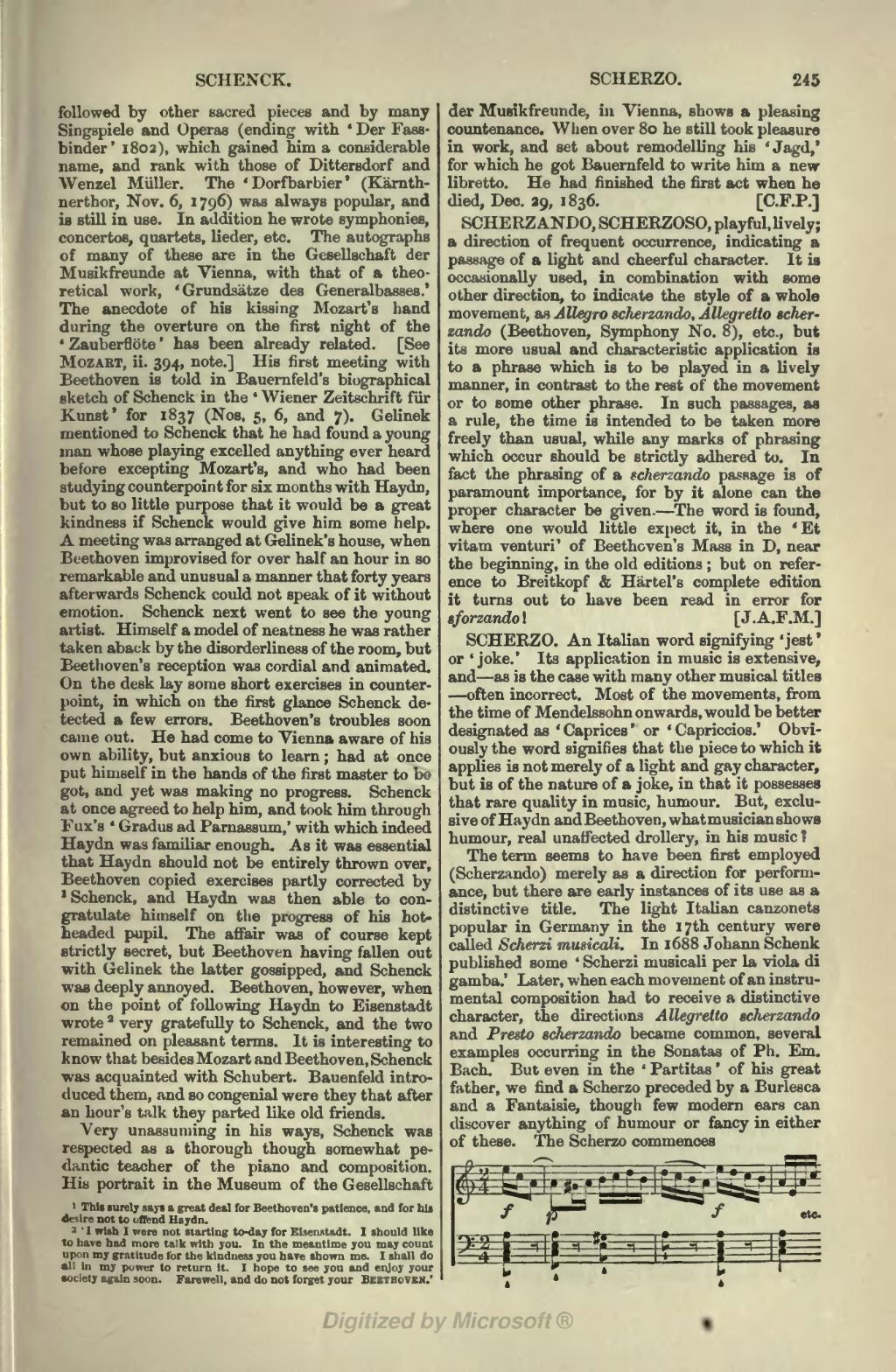followed by other sacred pieces and by many Singspiele and Operas (ending with 'Der Fassbinder' 1802), which gained him a considerable name, and rank with those of Dittersdorf and Wenzel Müller. The 'Dorfbarbier' (Kärnthnerthor, Nov. 6, 1796) was always popular, and is still in use. In addition he wrote symphonies, concertos, quartets, lieder, etc. The autographs of many of these are in the Gesellschaft der Musikfreunde at Vienna, with that of a theoretical work, 'Grundsätze des Generalbasses.' The anecdote of his kissing Mozart's hand during the overture on the first night of the 'Zauberflöte' has been already related. [See Mozart, ii. 394, note.] His first meeting with Beethoven is told in Bauernfeld's biographical sketch of Schenck in the 'Wiener Zeitschrift für Kunst' for 1837 (Nos, 5, 6, and 7). Gelinek mentioned to Schenck that he had found a young man whose playing excelled anything ever heard before excepting Mozart's, and who had been studying counterpoint for six months with Haydn, but to so little purpose that it would be a great kindness if Schenck would give him some help. A meeting was arranged at Gelinek's house, when Beethoven improvised for over half an hour in so remarkable and unusual a manner that forty years afterwards Schenck could not speak of it without emotion. Schenck next went to see the young artist. Himself a model of neatness he was rather taken aback by the disorderliness of the room, but Beethoven's reception was cordial and animated. On the desk lay some short exercises in counterpoint, in which on the first glance Schenck detected a few errors. Beethoven's troubles soon came out. He had come to Vienna aware of his own ability, but anxious to learn; had at once put himself in the hands of the first master to be got, and yet was making no progress. Schenck at once agreed to help him, and took him through Fux's 'Gradus ad Parnassum,' with which indeed Haydn was familiar enough. As it was essential that Haydn should not be entirely thrown over, Beethoven copied exercises partly corrected by [1]Schenck, and Haydn was then able to congratulate himself on the progress of his hot-headed pupil. The affair was of course kept strictly secret, but Beethoven having fallen out with Gelinek the latter gossipped, and Schenck was deeply annoyed. Beethoven, however, when on the point of following Haydn to Eisenstadt wrote[2] very gratefully to Schenck, and the two remained on pleasant terms. It is interesting to know that besides Mozart and Beethoven, Schenck was acquainted with Schubert. Bauenfeld introduced them, and so congenial were they that after an hour's talk they parted like old friends.
Very unassuming in his ways, Schenck was respected as a thorough though somewhat pedantic teacher of the piano and composition. His portrait in the Museum of the Gesellschaft der Musikfreunde, in Vienna, shows a pleasing countenance. When over 80 he still took pleasure in work, and set about remodelling his 'Jagd,' for which he got Bauernfeld to write him a new libretto. He had finished the first act when he died, Dec. 29, 1836.
SCHERZANDO, SCHERZOSO, playful, lively; a direction of frequent occurrence, indicating a passage of a light and cheerful character. It is occasionally used, in combination with some other direction, to indicate the style of a whole movement, as Allegro scherzando, Allegretto scherzando (Beethoven, Symphony No. 8), etc., but its more usual and characteristic application is to a phrase which is to be played in a lively manner, in contrast to the rest of the movement or to some other phrase. In such passages, as a rule, the time is intended to be taken more freely than usual, while any marks of phrasing which occur should be strictly adhered to. In fact the phrasing of a scherzando passage is of paramount importance, for by it alone can the proper character be given.—The word is found, where one would little expect it, in the 'Et vitam venturi' of Beethoven's Mass in D, near the beginning, in the old editions; but on reference to Breitkopf & Härtel's complete edition it turns out to have been read in error for sforzando!
SCHERZO. An Italian word signifying 'jest' or 'joke.' Its application in music is extensive, and—as is the case with many other musical titles—often incorrect. Most of the movements, from the time of Mendelssohn onwards, would be better designated as 'Caprices' or 'Capriccios.' Obviously the word signifies that the piece to which it applies is not merely of a light and gay character, but is of the nature of a joke, in that it possesses that rare quality in music, humour. But, exclusive of Haydn and Beethoven, what musician shows humour, real unaffected drollery, in his music?
The term seems to have been first employed (Scherzando) merely as a direction for performance, but there are early instances of its use as a distinctive title. The light Italian canzonets popular in Germany in the 17th century were called Scherzi musicali. In 1688 Johann Schenk published some 'Scherzi musicali per la viola di gamba.' Later, when each movement of an instrumental composition had to receive a distinctive character, the directions Allegretto scherzando and Presto scherzando became common, several examples occurring in the Sonatas of Ph. Em. Bach. But even in the 'Partitas' of his great father, we find a Scherzo preceded by a Burlesca and a Fantaisie, though few modern ears can discover anything of humour or fancy in either of these. The Scherzo commences

- ↑ This surely says a great deal for Beethoven's patience, and for his desire not to offend Haydn.
- ↑ 'I wish I were not starting to-day for Eisenstadt. I should like to have had more talk with you. In the meantime you may count upon my gratitude tor the kindness you have shown me. I shall do all in my power to return it. I hope to see you and enjoy your society again soon. Farewell, and do not forget your Beethoven.'
